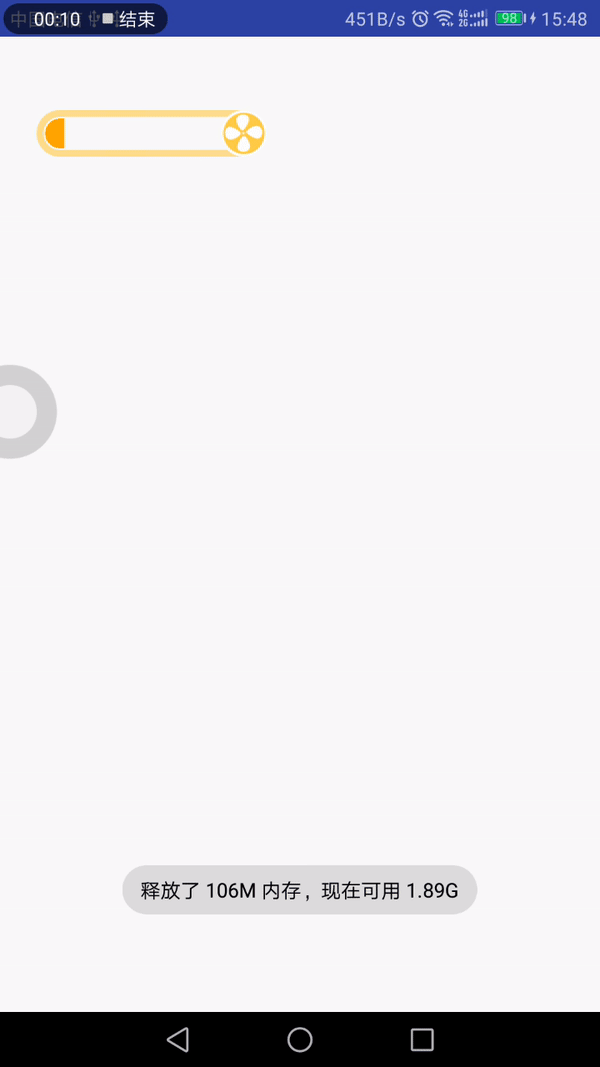最近看到有个gif动画效果挺不错的,可以拿来当项目的LoadingView,所以就花点时间做了下。先来看下效果图:

分析
从效果上看,我们可以将其拆分成以下几部分:
(1)底部框:带有黄色边框的圆角矩形和右边的圆形,为了方便,整个底部框切了,不需要我们去绘制圆角矩形和圆形了;

(2)进度框:带有进度值和色值的圆角矩形框,特殊的是它的圆角只有左上角和左下角是,另外的两个角是直角;
(3)风扇:在底部框的圆形位置中,绘制风扇,它可以旋转,直至进度加载完毕;
(4)叶子:从风扇处飘出,有多个叶子,按照一定的曲线和频率飘荡,遇到了进度框,看起来似乎融入进去了。
我们需要考虑的有几个问题:
1:叶子是随机产生的;
2:叶子遇到进度框,像是融进去了,不在显示了;
3:叶子是随着一条正余弦曲线移动;
4:叶子飘出的角度是不一样的,而且移动的振幅也不一样,比较有美感。
这样子,我们需要处理的有以下几部分:
一是,绘制底部框;
二是,不断往前绘制的进度条;
三是,不断旋转的风扇;
最后,不断飘出的叶子。
=========================================================
我们先处理第一部分
private void drawBackground(Canvas canvas){
Bitmap bitmap = BitmapFactory.decodeResource(mContext.getResources(), R.mipmap.leaf_kuang);
mPicWidth = bitmap.getWidth();
mPicHeight = bitmap.getHeight();
canvas.drawBitmap(bitmap,0,0,mBgPaint);
mTotalProgressWidth = mPicWidth - 76;
}
第二部分
利用Path的addRoundRect方法绘制可定制圆角的圆角矩形。绘制进度值,它的宽度的计算是进度值/100*总进度的宽度。因为,我们刚刚先绘制了底部框,然后绘制进度框,两者会有相交的地方,遵循上层覆盖下层原则,会出现相交的部分显示在底部框之上,不符合我们的效果。所以给它设置下图片混合效果DST_OVER,就可以了。
private void drawProgress(Canvas canvas){
mProgressWidth = mProgress/100 * mTotalProgressWidth;
RectF rectF = new RectF();
rectF.left = 16;
rectF.top = 16;
rectF.right = mProgressWidth;
rectF.bottom = mPicHeight-16;
float[] radius = new float[8];
radius[0] = 40;
radius[1] = 40;
radius[2] = 0;
radius[3] = 0;
radius[4] = 0;
radius[5] = 0;
radius[6] = 40;
radius[7] = 40;
Path path = new Path();
path.addRoundRect(rectF,radius, Path.Direction.CW);
//SRC 上层 DST 下层
mProgressPaint.setXfermode(new PorterDuffXfermode(PorterDuff.Mode.DST_OVER));//设置图片混合显示效果
canvas.drawPath(path,mProgressPaint);
}
第三部分
我们通过Matrix矩阵操作图片,可以让图片旋转,缩放。首先,风扇图片是显示在底部框最右边的圆形位置(称为R位置),所以需要先位移坐标。原来的坐标原点是在(0,0),现在图片是要在R位置旋转,缩放,所以通过setTranslate设置图片的坐标位置,然后在进度未达到100%时,让图片需要不停的旋转;达到95%以上,这时图片会进行缩放;达到100%时,就显示文本。
private void drawFan(Canvas canvas){
int centerX = (int) mTotalProgressWidth;
int centerY = 8;
if(mProgress == 100){
String text = "100%";
canvas.drawText(text,centerX,mPicHeight/2+getTextHeight(text)/2,mFanPaint);
}else{
Bitmap bitmap = BitmapFactory.decodeResource(mContext.getResources(), R.mipmap.fengshan);
int bitmapWidth = bitmap.getWidth();
int bitmapHeight = bitmap.getHeight();
Matrix matrix = new Matrix();
matrix.setTranslate(centerX, centerY); //设置图片的原点坐标
if (this.mProgress >= 95 && this.mProgress < 100){
float scale = Math.abs(this.mProgress - 100) * 0.2f;
//缩放 参数1:X轴缩放倍数,参数2:Y轴缩放倍数 参数3,4:缩放中心点
matrix.preScale(scale,scale,(float)bitmapWidth/2, (float)bitmapHeight/2);
}else{
//旋转 参数1:角度,参数2,3:旋转中心点
matrix.preRotate(mAngle, (float)bitmapWidth/2, (float)bitmapHeight/2);
}
canvas.drawBitmap(bitmap, matrix, mFanPaint);
if (this.mProgress != 100){
mAngle += 60;
}
}
}
最后一部分
首先根据效果情况基本确定出曲线函数,标准函数方程为:y = A(wx+Q)+h,其中w影响周期,A影响振幅 ,周期T= 2 * Math.PI/w;
根据效果可以看出,周期T大致为总进度长度,所以确定w=(float) ((float) 2 * Math.PI /mTotalProgressWidth);
由以上的分析可知,叶子是有位置(x,y),有振幅的幅度type(低等幅度,中等幅度,高等幅度),有旋转的角度和方向rotateAngle和rotateDirection,它是随机产生的,有个起始时间startTime。
叶子Leaf类就此产生:
private enum StartType {
LITTLE, MIDDLE, BIG
}
/**
* 叶子对象,用来记录叶子主要数据
*
*/
private class Leaf {
// 在绘制部分的位置
float x, y;
// 控制叶子飘动的幅度
StartType type;
// 旋转角度
int rotateAngle;
// 旋转方向--0代表顺时针,1代表逆时针
int rotateDirection;
// 起始时间(ms)
long startTime;
}
叶子是可以随机产生一个或多个的,所以我们提供了一个LeafFactory类来生产叶子:
private class LeafFactory {
private static final int MAX_LEAFS = 8;
Random random = new Random();
// 生成一个叶子信息
public Leaf generateLeaf() {
Leaf leaf = new Leaf();
int randomType = random.nextInt(3);
// 随时类型- 随机振幅
StartType type = StartType.MIDDLE;
switch (randomType) {
case 0:
break;
case 1:
type = StartType.LITTLE;
break;
case 2:
type = StartType.BIG;
break;
default:
break;
}
leaf.type = type;
// 随机起始的旋转角度
leaf.rotateAngle = random.nextInt(360);
// 随机旋转方向(顺时针或逆时针)
leaf.rotateDirection = random.nextInt(2);
// 为了产生交错的感觉,让开始的时间有一定的随机性
mLeafFloatTime = mLeafFloatTime <= 0 ? LEAF_FLOAT_TIME : mLeafFloatTime;
mAddTime += random.nextInt((int) (mLeafFloatTime));
leaf.startTime = System.currentTimeMillis() + mAddTime;
return leaf;
}
// 根据最大叶子数产生叶子信息
public List<Leaf> generateLeafs() {
return generateLeafs(MAX_LEAFS);
}
// 根据传入的叶子数量产生叶子信息
public List<Leaf> generateLeafs(int leafSize) {
List<Leaf> leafs = new LinkedList<Leaf>();
for (int i = 0; i < leafSize; i++) {
leafs.add(generateLeaf());
}
return leafs;
}
}
接下来,我们就可以获取到叶子的Y坐标了:
// 通过叶子信息获取当前叶子的Y值
private int getLocationY(Leaf leaf) {
// y = A(wx+Q)+h
float w = (float) ((float) 2 * Math.PI / mTotalProgressWidth);
float a = mMiddleAmplitude;
switch (leaf.type) {
case LITTLE:
// 小振幅 = 中等振幅 - 振幅差
a = mMiddleAmplitude - mAmplitudeDisparity;
break;
case MIDDLE:
a = mMiddleAmplitude;
break;
case BIG:
// 小振幅 = 中等振幅 + 振幅差
a = mMiddleAmplitude + mAmplitudeDisparity;
break;
default:
break;
}
return (int) (a * Math.sin(w * leaf.x)) + 40 * 2 / 3;//40是圆角半径
}
接下来,开始绘制叶子:
/**
* 绘制叶子
*
* @param canvas
*/
private void drawLeaf(Canvas canvas) {
mLeafRotateTime = mLeafRotateTime <= 0 ? LEAF_ROTATE_TIME : mLeafRotateTime;
long currentTime = System.currentTimeMillis();
for (int i = 0; i < mLeafInfos.size(); i++) {
Leaf leaf = mLeafInfos.get(i);
if (currentTime > leaf.startTime && leaf.startTime != 0) {
// 绘制叶子--根据叶子的类型和当前时间得出叶子的(x,y)
getLeafLocation(leaf, currentTime);
// 根据时间计算旋转角度
canvas.save();
// 通过Matrix控制叶子旋转
Matrix matrix = new Matrix();
float transX = leaf.x;
float transY = leaf.y;
Log.e("(x,y)=","("+transX+","+transY+")");
if (transX > mProgressWidth) {//叶子遇到进度框,就融入了不再显示
matrix.postTranslate(transX, transY);
// 通过时间关联旋转角度,则可以直接通过修改LEAF_ROTATE_TIME调节叶子旋转快慢
float rotateFraction = ((currentTime - leaf.startTime) % mLeafRotateTime)
/ (float) mLeafRotateTime;
int angle = (int) (rotateFraction * 360);
// 根据叶子旋转方向确定叶子旋转角度
int rotate = leaf.rotateDirection == 0 ? angle + leaf.rotateAngle : -angle
+ leaf.rotateAngle;
matrix.postRotate(rotate, transX
+ mLeafWidth / 2, transY + mLeafHeight / 2);
canvas.drawBitmap(mLeafBitmap, matrix, mLeafPaint);
canvas.restore();
}
} else {
continue;
}
}
}
/**
* 获取叶子的x,y
* @param leaf
* @param currentTime
*/
private void getLeafLocation(Leaf leaf, long currentTime) {
long intervalTime = currentTime - leaf.startTime;
mLeafFloatTime = mLeafFloatTime <= 0 ? LEAF_FLOAT_TIME : mLeafFloatTime;
if (intervalTime < 0) {
return;
} else if (intervalTime > mLeafFloatTime) {
leaf.startTime = System.currentTimeMillis()
+ new Random().nextInt((int) mLeafFloatTime);
}
float fraction = (float) intervalTime / mLeafFloatTime;
leaf.x = (int) (mTotalProgressWidth - mTotalProgressWidth * fraction);
leaf.y = getLocationY(leaf);
}
最后,向外暴露几个方法:
/**
* 设置进度
* @param progress
*/
public void setProgress(float progress){
mProgress = progress;
invalidate();
}
/**
* 进度框颜色
* @param color
*/
public void setProgressColor(int color){
this.mProgressColor = color;
}
/**
* 设置中等幅度值
* @param amplitude
*/
public void setAmplitude(int amplitude){
this.mMiddleAmplitude = amplitude;
}
/**
* 设置幅度差
* @param amplitudeDisparity
*/
public void setAmplitudeDisparity(int amplitudeDisparity){
this.mAmplitudeDisparity = amplitudeDisparity;
}
使用方式
(1)Activity:
public class MainActivity extends AppCompatActivity {
private final int REFRESH_PROGRESS = 1000;
private float mProgress = 0;
//利用handler实现动画
private Handler mHandler = new Handler() {
public void handleMessage(Message msg) {
switch (msg.what) {
case REFRESH_PROGRESS:
if (mProgress <= 100) {
mProgress += 1;
// 随机100ms以内刷新一次
mHandler.sendEmptyMessageDelayed(REFRESH_PROGRESS,
100);
mLoadingView.setProgress(mProgress);
}
break;
default:
break;
}
};
};
private LoadingLeafView mLoadingView;
@Override
protected void onCreate(Bundle savedInstanceState) {
super.onCreate(savedInstanceState);
setContentView(R.layout.activity_main);
findControl();
}
private void findControl(){
mLoadingView = (LoadingLeafView) findViewById(R.id.loading_leaf_view);
// mLoadingView.setProgressColor(Color.RED);
// mLoadingView.setAmplitude(16);
// mLoadingView.setAmplitudeDisparity(10);
mHandler.sendEmptyMessageDelayed(REFRESH_PROGRESS, 100);
}
(2)layout:
<LinearLayout
android:layout_width="match_parent"
android:layout_height="wrap_content"
android:orientation="horizontal">
<com.ha.cjy.myproject.view.widget.LoadingLeafView
android:id="@+id/loading_leaf_view"
android:layout_marginTop="48dp"
android:layout_marginLeft="24dp"
android:layout_width="302dp"
android:layout_height="61dp"/>
</LinearLayout>